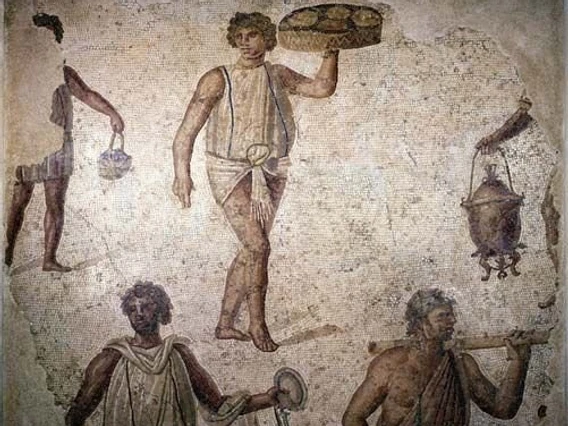
Hypnos, Greek god of sleep, holds his wand over Leda as Zeus comes to her at night as a swan
Modern science views dreams as a set of images or stories created by the brain as a means of processing the day’s events, anxieties about the future, suppressed emotions and desires, and other deep-seated psychological concerns. Some people believe that they do more–that they serve as channels of communication from a supernatural realm. Both schools of thought have people who claim to be able to interpret dreams to discern their hidden meaning.
A similar divide existed in the Greco-Roman world, though neither side viewed dreams in quite the same way as people might today. The vast majority of people saw dreams as a channel for the gods to speak to humans. Both Greeks and Romans personified sleep as a deity (Hypnos for the Greeks, Somnus for the Romans), while other gods were associated with the process of dreaming. The principal god in this area was Morpheus, who understandably was regarded as one of the sons of the god of sleep. Morpheus was especially important because he could take on whatever form was needed to express the will of the gods.

Asklepios and Hygeia visit a sleeping girl in a dream
Other gods, too, could appear in dreams and speak to humans, especially those who were their personal favorites. Most of these appearances are portrayed as serendipitous and thus beyond the power of humans to pursue. But there was one god who was believed to welcome people who approached him for dreams: Asklepios (known to the Romans as Asclepius or Aesculapius), the god of healing. Sick people would sleep in his temples in hopes that Asklepios and/or his daughter Hygeia (Health) would visit them in a dream and either heal them or prescribe how their illness should be treated. Those who did not find healing at the local temple and could afford to travel would visit one of the god’s health care centers in Greece or Asia Minor, where Asklepios was believed to spend more time. Here special buildings were set apart for people to sleep and await dreams from the god after complying with a complex set of rituals designed to prepare them for the encounter. In the daytime they could take advantage of spa-like facilities and the services of physicians who regarded their expertise as a gift of Asklepios and a tool through which the god could work.

Hippocrates (left) and Asklepios (center) speaking to a visitor at the god’s sanctuary at Kos
Physicians who were not associated with these healing centers had a different view of dreams. Dreams are mentioned in several of the treatises attributed to Hippocrates, the father of Greek medicine. The prevailing view here is that, while the gods might at times choose to speak to humans through dreams, most dreams are the product of the human soul and provide clues to the inner state of the body. Good dreams signify health, while bad dreams point to some type of disturbance in the workings of the body. Different types of dreams were thought to point to different types of illness. Physicians needed to learn how to interpret dreams so that they could properly diagnose and treat the body’s malfunctions.
Another model of dream interpretation saw dreams as predictors of future outcomes. Certain types of dreams foretold a happy future and others spoke of looming disaster or even death. The popularity of such views is evident from the fact that many wealthy Romans had a dream interpreter on retainer to interpret their dreams as they made decisions about the future. At a more popular level, such ideas are associated with wandering dream interpreters who would set up shop in a visible spot in the city and interpret people’s dreams for a fee, then move on before the accuracy (or inaccuracy) of their predictions became apparent. Interpreters of this sort were routinely mocked by elite Greco-Roman authors as charlatans and frauds.
Dreams and dream interpretation play a central role in my new historical novels, A Rooster for Asklepios and A Bull for Pluto, both of which are set in Roman Asia Minor (modern Turkey) in the first century AD. Together they tell about a lengthy journey to and from the sanctuary of Asklepios at Pergamon (western Turkey), where one of my main characters, a wealthy Roman citizen named Lucius, is hoping to meet Asklepios in a dream and be healed. To learn what happens to him there, you’ll have to read the books! Plot summaries are available under the Books tab on my Website for the series (https://u.nu/arpjk), where you can also find links to various sites where they can be purchased. The first five chapters of both books can also be downloaded from the same page.



